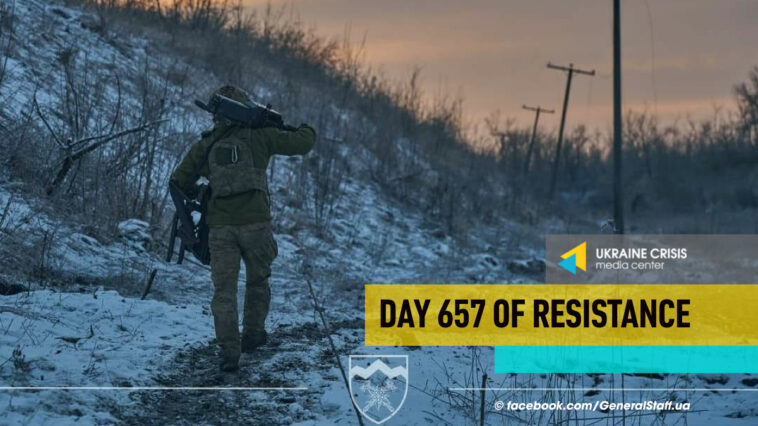Ukrainian troops have recaptured a spoil heap on the outskirts of Horlivka, in Donetsk region. A powerful cyberattack hits Ukraine’s largest mobile operator, knocking out service to millions. Ukraine is looking into options in case its allies fail to come up with financial aid, according to Bloomberg’s reporting.
Ukrainian troops recapture spoil heap on outskirts of Horlivka
An assault group of the 24th “King Danylo” separate mechanized brigade has recaptured a spoil heap on the outskirts of Horlivka, a town in Donetsk region that has been occupied by Russia since 2014. Ukrainian troops have planted the Ukrainian flag there.
President Zelenskyi said on social media on Tuesday: “I thank our heroes, the assault group of our royal brigade, the 24th Mechanized Brigade named after King Danylo Halytskyi! Despite the challenging conditions, they captured one of the slagheaps within Horlivka and took over enemy positions.”
The Ukrainian flag is now flying atop the spoil heap, he added. “Horlivka is Ukraine! Donbas is Ukraine!” the President said.
Powerful cyberattack hits Ukraine’s largest mobile operator, knocking out service to millions
On December 12, Kyivstar, Ukraine’s largest mobile operator came under a powerful cyberattack that knocked out mobile and internet services to millions of people.
The national roaming scheme was also offline, so that Kyivstar users could not roam on a different provider. The mobile company was not able to pass on user data to other service providers, an official from the Ministry of Digital Transformation explained to NV Business.
Following major network outages, it was “unclear” when service would be restored, Kyivstar CEO Oleksandr Komarov said in a television appearance. “Kyivstar has not yet given estimated time of restoration. [That was] a very powerful hacker attack on the company’s virtual infrastructure. The IT infrastructure has been partially destroyed. We are still assessing how much time it will take to restore the service. We have not issued any statements yet,” Komarov said.
“The war with Russia has many dimensions and one of them is in cyberspace,” he said in a separate video address.
“Unfortunately, this morning, Kyivstar became the target of a powerful hacker attack that temporarily disrupted mobile and internet services. It is yet unclear when [the company] would be able to restore connection. We are working to restore communication as soon as possible,” Komarov said.
In a press statement, Ukraine’s Security Service said it had opened a criminal investigation into the cyberattack on the national mobile service provider, Kyivstar. One line of inquiry would be whether Russia’s security services were behind the attack.
Ukraine’s Security Service also said it had sent an operative-investigative team to work closely with Kyivstar technicians shortly after the network failure. Security service’s cyber specialists continue to assist the operator and coordinate the work of all government agencies in order to restore service as soon as possible, the statement said.
Ukraine looking into options in case its allies fail to come up with financial aid, Bloomberg says
Policymakers in Kyiv are trying to work out how they can fund Ukraine’s war effort if its allies fail to come through with promised aid, Bloomberg said Tuesday.
The financial toolkit includes raising tax revenue, an obvious challenge in a battered economy, or cutting spending for an already beleaguered public. Monetary-policy options are devaluing the Ukrainian currency or returning to the central bank’s taps, a move Finance Minister Serhiy Marchenko told Bloomberg would have “negative consequences.”
Kyiv plans to cover its budget deficit, amounting to around one-fifth of economic output, primarily with more than USD 40 billion in external financing next year. The Ukrainian finance chief said last month that more than two-thirds of that funding hadn’t yet been confirmed.
“If the shortage of foreign aid inflows becomes larger than several billion US dollars, the authorities will only have unpleasant options to choose from,” said Olena Bilan, chief economist at Kyiv-based investment bank Dragon Capital.
Another monetary option is tried and tested: printing money. Last year the NBU (Ukraine’s central bank) issued almost 400 billion hryvnia (USD 10.9 billion) through purchases of government-issued bonds, mostly in the first months of the war, plugging monthly gaps before international donors created a steady flow of funding.
The International Monetary Fund, which is set to disburse USD 5.3 billion in loans next year, set limits to the practice as part of its conditions: in case of an external funding shortfall, Kyiv pledged to limit monetary financing to about 50 billion hryvnia per quarter after reaching a ceiling on market borrowing, according to the IMF.




